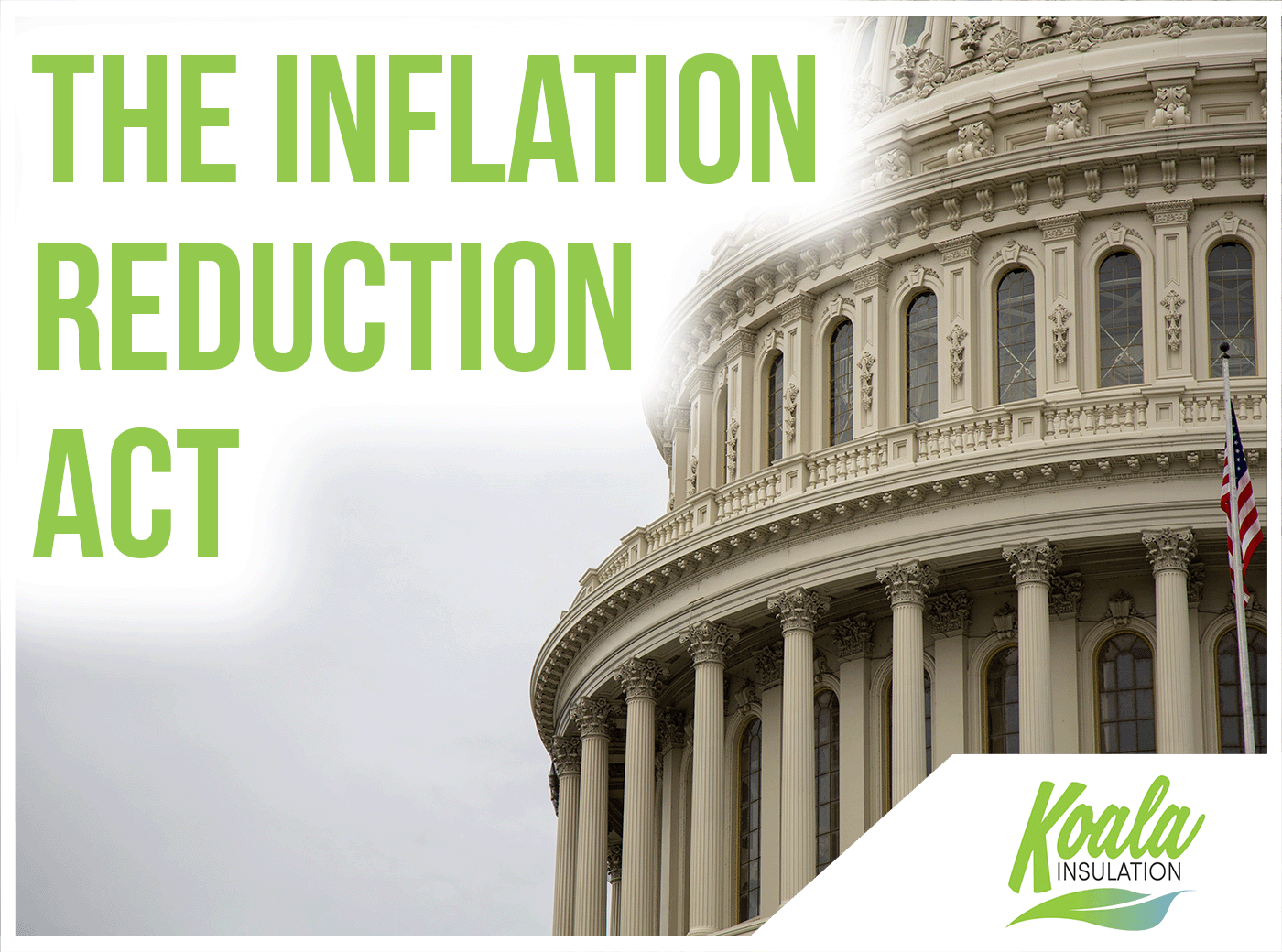
The Inflation Reduction Act Introduces New Way to Save With Insulation
Property owners that are planning to make renovations in 2023 just got some great news: The Inflation Reduction Act is improving several opportunities to earn some money back while improving energy efficiency. Passed by the Senate on August 7 and signed into law on August 16 last year, this bill is going to play a significant role in home improvement plans.
One of the primary focuses of the Inflation Reduction Act has been to address climate change, making an effort to encourage eco-friendly products and services. This also includes providing aid to clean energy production. But what does that entail for you and your household or property?
At A Glance: The Three Major Changes
If you’re familiar with the Nonbusiness Energy Property Credit that ended in 2021, you may already be aware of the tax credits homeowners can claim on certain purchases. The Energy Efficient Home Improvement Credit within the Inflation Reduction Act is going to have a similar role with new and improved initiatives. Essentially, this is going to provide the opportunity to reduce your tax bill when you make energy-efficient upgrades to your home and appliances.
The HOMES (Home Owner Managing Energy Savings) Rebate Program within the act is designed to help provide cash back by reducing overall energy use in your household. Certain home improvement projects, like insulation upgrades, earn money back based on how much you're projected to save based on a DOE-approved energy audit.
The bill also introduces the High-Efficiency Electric Home Rebate Program. This will encourage households to make environmentally friendly choices by offering rebates for certain purchases. Low- and middle-income families will specifically qualify for certain rebates on energy-efficient renovations and appliances at a different rate.
What Does The Inflation Reduction Act Provide To Your Household?
The changes introduced with the Inflation Reduction Act have just increased your return on investment opportunities for energy efficiency upgrades throughout your home. This includes updating your insulation and air sealing to improve temperature regulation, indoor air quality, and energy waste reduction. There will be a few possible ways to reduce the expense with the tax initiatives.
The first way, which will most likely be the most common for typical households, is through the Energy Efficient Home Improvement Credit. 30% of the cost of energy-saving installation purchases - like insulation, windows, doors, and other changes - can be claimed to start in 2023. The previous credit system (the Nonbusiness Energy Property Credit) had a $500 lifetime limit; this has been replaced by a $1,200 annual limit with various annual limit changes for certain types of qualifying improvements.
The HOMES Rebate Program is going to be another great way for homeowners to reduce their energy waste while also earning money back on various types of upgrades. Through the DOE-approved energy audits, your rebate will be determined based on the amount of energy saved, the modeled savings, and your household income. There are 3 rebate amounts you can earn from, earning the lesser of either 50% of the project cost or the following:
- Measured Energy Savings <15%: up to $2,000 for a 20% reduction of energy use
- Modeled Energy Savings 20%-35% : $2,000
- Modeled Energy Savings >35% : $4,000
The final potential opportunity comes from the High-Efficiency Electric Home Rebate Program In an effort to encourage households to make environmentally friendly choices, rebates within the HOMES program will be offered to low- and middle-income families for certain purchases. If your total annual income is less than 150% of the median income in your area, you’ll qualify for rebates on energy-efficient renovations and appliances. For insulation, air sealing, and ventilation, specifically, your household can get up to $1,600 in rebates for your purchases. There are a few limits and additional qualifications, so make sure you meet the requirements before setting out on a major home improvement project.
Many of these rebates and funding will be funneled through state programs, providing even more opportunities to overlap with other programs and applications. This helps to increase individual energy efficiency rebate programs depending on your area’s initiatives. Many of these funds will remain available through 2031 or longer in certain cases, so don’t worry about getting everything changed immediately!
Updating Your Insulation For Year-Round Savings
Properly installed and regularly updated insulation and air sealing are significant factors in maintaining a safe and comfortable environment. These materials contribute to thermal regulation and climate control by reducing the rate at which heat moves through a building, known as heat transfer, and air leaks, which allow for drafts, heat loss, and air pollution. While these typically fall into the “out of sight, out of mind” problem for many homeowners, regularly evaluating spaces like your walls, floors, attic, and basement can even reduce problems like pest infestation and mold risk.
In addition to the new Inflation Reduction Act and other energy efficiency rebate programs, having updated insulation and air sealing provide a quality return on investment throughout the year. These materials reduce heat transfer and air leaks, helping to lower your regular heating and cooling bills year-round. Having controlled climate and temperature regulation means your HVAC system runs less often, reducing energy waste and costs.
How Can The Inflation Reduction Act Influence Your Savings In The Future?
This new bill is going to have a significant impact on households throughout the U.S. during 2023. That's why it's important to make sure you're working with industry experts who not only understand the advantages the Inflation Reduce Act can provide you and your household but a team that is dedicated to improving your environment. At Koala Insulation of Greenville, our insulation professionals provide cost-effective service and environmentally friendly products to our community, improving the energy efficiency of your neighborhood without sacrificing the budget.
Our free evaluations give you the opportunity to take a closer look at the current condition of your home’s insulation and air sealing. With a detailed explanation, you can maximize the benefits you and your household can earn from the Inflation Reduction Act by upgrading deteriorated materials. For more information on how to use the advantages of The Inflation Reduction Act for your insulation needs, contact Koala Insulation of Greenville today to schedule your free evaluation.
Ready to book your free insulation evaluation?
We have 3 convienant ways for you to get in touch
We Provide Insulation Services to the Following Greenville Areas
DUNCAN, LANDRUM, LYMAN, GREENVILLE, GREER, TAYLORS, EASLEY, TRAVELERS REST, BELTON, FOUNTAIN INN, MAULDIN, PELZER, PIEDMONT, SIMPSONVILLE, WILLIAMSTON
Counties Served
SPARTANBURG, GREENVILLE, PICKENS, ANDERSON, LAURENS
Zip Code
29334, 29356, 29365, 29615, 29650, 29651, 29687, 29601, 29605, 29607, 29609, 29611, 29613, 29614, 29617, 29640, 29642, 29690, 29627, 29644, 29662, 29669, 29673, 29680, 29681, 29697

